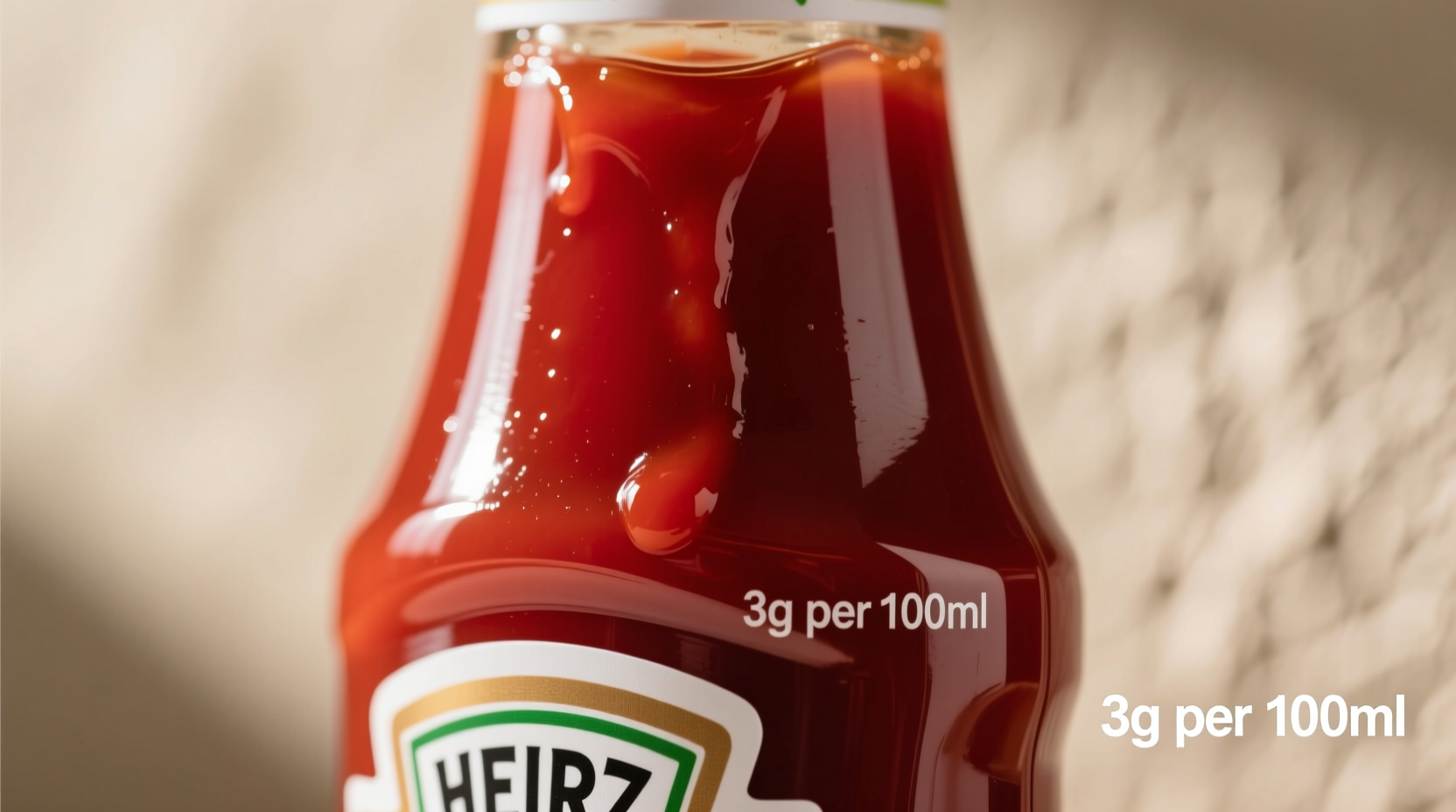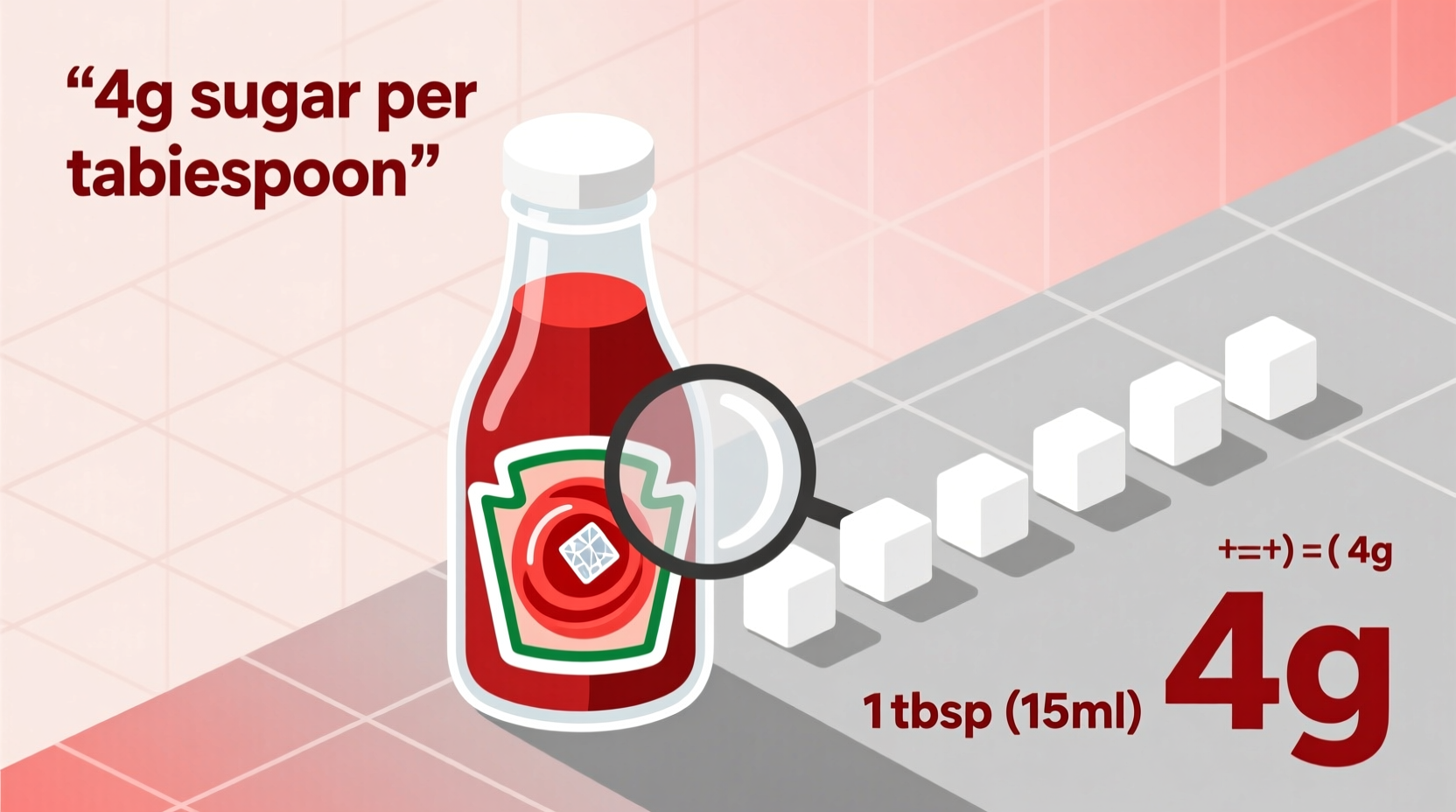Understanding exactly how much sugar is in tomato ketchup matters more than you might think. While ketchup seems like a harmless condiment, its sugar content can add up quickly when used regularly. Most commercial brands contain between 3-4 grams of sugar per tablespoon serving, with the sugar primarily coming from high-fructose corn syrup or regular sugar added during processing.
Breaking Down Ketchup Sugar Content
When examining ketchup nutrition facts, it's essential to understand both the per-serving measurements and how they translate to real-world usage. Most people use more than the standard 1-tablespoon serving when adding ketchup to burgers, fries, or other foods.
| Condiment | Serving Size | Sugar Content | Equivalent Teaspoons |
|---|---|---|---|
| Traditional Tomato Ketchup | 17g (1 tbsp) | 4g | 1 tsp |
| No-Sugar-Added Ketchup | 17g (1 tbsp) | 2g | 0.5 tsp |
| Barbecue Sauce | 30g (2 tbsp) | 12g | 3 tsp |
| Mustard | 15g (1 tbsp) | 1g | 0.25 tsp |
| Hot Sauce | 5g (1 tsp) | 0g-1g | 0-0.25 tsp |
This comparison shows that while ketchup isn't the highest-sugar condiment, it contains significantly more sugar than many people realize, especially when compared to alternatives like mustard or hot sauce. The USDA FoodData Central confirms that standard ketchup derives about 25% of its calories from sugar.
How Ketchup Sugar Content Has Evolved
Tomato ketchup hasn't always contained this amount of sugar. Understanding the historical context helps explain why modern ketchup has become sweeter:
- 1800s: Early ketchup recipes were primarily vinegar-based with minimal sweeteners
- Early 1900s: Sugar began appearing in commercial recipes to balance tomato acidity
- 1980s: High-fructose corn syrup replaced some sugar as a cost-effective sweetener
- Today: Most major brands maintain 3-4g sugar per tablespoon, though "no sugar added" options have emerged
This evolution reflects changing consumer preferences toward sweeter tastes and the food industry's response to those preferences. According to research published in the National Center for Biotechnology Information, the average American's sugar consumption has increased by more than 30% since the 1970s, influencing product formulations across the food industry.

Reading Ketchup Nutrition Labels Effectively
When evaluating sugar in ketchup, understanding nutrition labels is crucial. Many consumers miss these important details:
- Serving size reality: The standard 17g serving is smaller than most people use. Two tablespoons (34g) contains 8g of sugar
- "No sugar added" claims: These products still contain natural sugars from tomatoes (about 2g per serving)
- Hidden sugar names: Check for high-fructose corn syrup, cane sugar, beet sugar, and other sweeteners listed in ingredients
- Daily value context: 4g of sugar represents 8% of the FDA's daily value for added sugars (based on 50g total)
The FDA's updated nutrition labeling requirements now distinguish between natural and added sugars, making it easier to identify how much sugar has been added to ketchup versus what comes naturally from tomatoes.
Practical Strategies for Managing Ketchup Sugar Intake
You don't need to eliminate ketchup entirely to reduce sugar consumption. Consider these practical approaches:
- Measure your portions: Use a measuring spoon instead of free-pouring from the bottle
- Try reduced-sugar versions: Many brands offer options with 30-50% less sugar
- Mix with alternatives: Blend regular ketchup with mustard to cut sugar content while maintaining flavor
- Make your own: Homemade ketchup lets you control sugar content (try using 1-2 tablespoons of sugar per cup of tomatoes)
- Check expiration dates: Older ketchup may separate, leading people to use more to achieve desired consistency
Registered dietitians often recommend treating ketchup like any other added sugar source in your diet. The American Heart Association suggests limiting added sugars to no more than 25g (6 teaspoons) daily for women and 36g (9 teaspoons) for men. With ketchup contributing 1 teaspoon per tablespoon, it's easy to see how this condiment can consume a significant portion of your daily sugar allowance.
When Ketchup Sugar Matters Most
For most healthy adults, the sugar in ketchup isn't a major concern when consumed in moderation. However, certain situations warrant extra attention to ketchup sugar content:
- Children's meals: Kids often consume ketchup liberally with fries and nuggets, potentially getting multiple servings at one meal
- Diabetes management: Those monitoring carbohydrate intake need to account for ketchup's sugar
- Weight management: Liquid calories from condiments can add up without providing satiety
- Processed food tracking: Ketchup is often overlooked when counting processed sugar sources
Research from the Centers for Disease Control and Prevention indicates that condiments contribute approximately 5-7% of added sugars in the average American diet. While this may seem small, it represents nearly 300-400 calories per week for regular ketchup users.
Conclusion: Making Informed Ketchup Choices
Understanding how much sugar is in tomato ketchup empowers you to make informed choices about this common condiment. With approximately 4 grams of sugar per tablespoon, traditional ketchup contributes meaningful amounts of added sugar to your diet. By measuring portions, selecting lower-sugar options when appropriate, and being aware of serving sizes versus actual consumption, you can enjoy ketchup while managing your sugar intake effectively.
Remember that context matters—occasional ketchup use won't derail a healthy diet, but regular heavy use could contribute to exceeding recommended sugar limits. The key is awareness and moderation, allowing you to enjoy this popular condiment without compromising your health goals.
How much sugar is in a single serving of ketchup?
A standard serving of ketchup (17g or 1 tablespoon) contains approximately 4 grams of sugar, which equals about 1 teaspoon of added sugar. This represents roughly 8% of the American Heart Association's recommended daily limit for added sugars for women.
Is the sugar in ketchup natural or added?
Traditional ketchup contains both natural sugars from tomatoes (about 1-2g per serving) and added sugars (typically high-fructose corn syrup or cane sugar) that account for the remaining 2-3g per serving. "No sugar added" varieties contain only the natural sugars from tomatoes.
How does ketchup sugar compare to other common condiments?
Ketchup contains more sugar than mustard (1g per tbsp) or hot sauce (0-1g per tsp), but less than barbecue sauce (12g per 2 tbsp). A single tablespoon of ketchup has about the same sugar content as a quarter of a standard candy bar.
Can I reduce sugar in ketchup without sacrificing taste?
Yes, you can mix regular ketchup with mustard in a 1:1 ratio to cut sugar content while maintaining flavor. Alternatively, look for reduced-sugar varieties that use natural sweeteners like stevia, or make your own ketchup using less sugar and more vinegar for balance.
How much ketchup is too much for daily sugar intake?
Consuming more than 3 tablespoons of regular ketchup daily would exceed 10% of the American Heart Association's recommended daily limit for added sugars. For women, this is more than 12g of added sugar; for men, more than 18g from ketchup alone.











 浙公网安备
33010002000092号
浙公网安备
33010002000092号 浙B2-20120091-4
浙B2-20120091-4